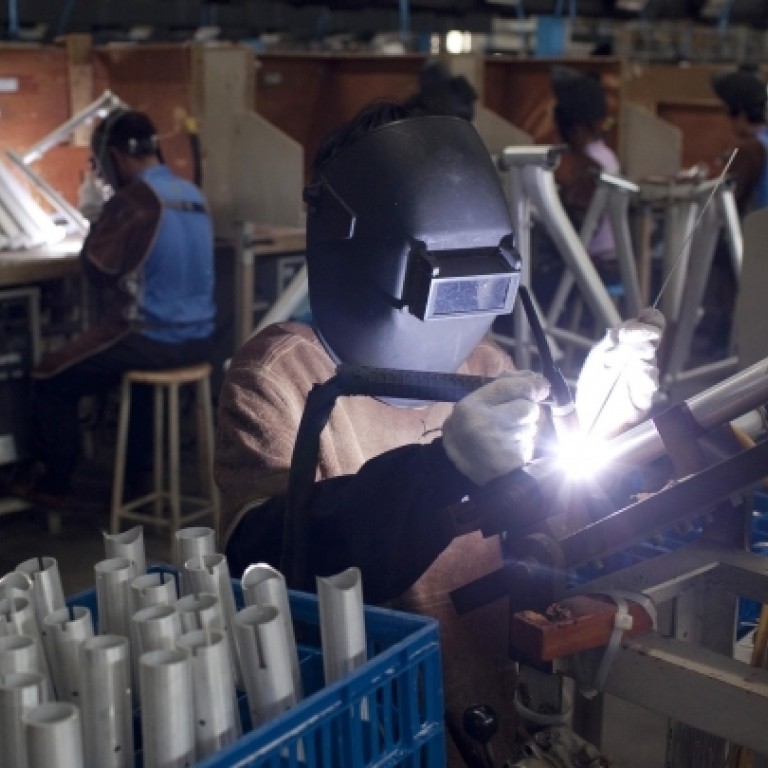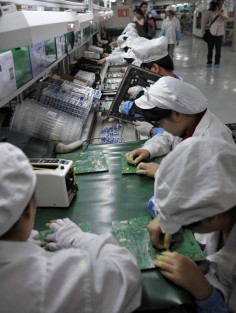
Bringing it all back home
Rising labour costs on the mainland mean that companies in Taiwan are repatriating the work that they once outsourced across the strait
For eight years, the former Taroko Textile Corp factory in Hsinchu county, Taiwan, has been empty, a victim of the migration of manufacturing to the mainland. Now, as the supply of cheap labour wanes across the strait, work is returning.
ITEQ Corp, which makes materials that electronics companies need to build circuit boards, is installing equipment as part of a NT$2 billion (HK$515 million) refurbishment to begin production by the end of 2014, said Eric Liu, the company's head of investor relations. It will be ITEQ's first new factory in Taiwan since 1998. ITEQ began moving work to Guangdong in 2002.
"People went to China because the costs were lower," Liu said. "But labour costs there have been rising over the past few years. We're returning to Taiwan also because of the good supply of skilled workers."
ITEQ, the bicycle maker Giant Manufacturing and the contact lens maker Ginko International are among companies tapping Taiwan's pool of engineering talent as the mainland's labour supply tightens and rising costs force manufacturers to make more sophisticated products. They are being encouraged by Taiwanese President Ma Ying-jeou, who has introduced tax cuts and other incentives in an effort to boost wages as his popularity slumps.
Tony Phoo, a Taipei-based economist at Standard Chartered, said: "The move to make it easier and attractive for overseas Taiwan companies, especially those with higher value added, is a positive step that will ensure the economy stays on a sustainable growth path." Bringing factories home is "one way to kick-start the economy", Phoo said.
Private investment will reach a record NT$2.3 trillion this year, up from NT$1.6 trillion in 2009, even as a global slowdown hurts exports, the Statistics Bureau estimates. Taiwan expects to lure about US$5 billion in 2013 from companies moving back. Last year, Taiwanese government-approved investment on the mainland fell to US$12.8 billion, from US$14.4 billion in 2011.
Ma has simplified investment procedures, pursued trade agreements with the US and Asia and relaxed immigration rules. He has also boosted ties with the mainland by allowing banks to conduct business in yuan and agreeing to lower tariffs on items from vehicle parts to textiles.
The president is trying to stem a slump in popular support to 14 per cent in May, a year into his second and final term. Growth slowed in 2012 to 1.32 per cent, while average wages, adjusted for inflation, fell in the first four months of this year to a four-year low. In the seven months since the president's tax and labour measures took effect, at least 34 companies, including the camera-lens maker Largan Precision and the tyre producer Kenda Rubber, have filed proposals to invest NT$182.6 billion on the island. That is more than triple the amount for 2011, the economic affairs ministry said.

Wang Wen Yuen, deputy chairman of the Taipei-based Chinese National Federation of Industries, said: "Times have changed from 20 to 30 years ago, when manufacturers left Taiwan. With the worsening global economy, we want the competitive companies to come back."
Last August, Ginko started a new factory in central Taiwan, and will add three more production lines this year. The company entered the mainland in 1995 through acquisitions and built up the mainland's most popular brand of contact lens, Hydron. Giant, which began investing in the mainland 20 years ago, is building a new headquarters and research and development centre in Taichung, central Taiwan. When it is completed in 2016, the company will boost production of top-end models at its factory, said chief executive Antony Lo.
"It's not economical any more to make high-end bicycles in Kunshan" in Jiangsu province, Lo said. "Taiwan has talent, artisans with good skills. It's hard to find people in China."

